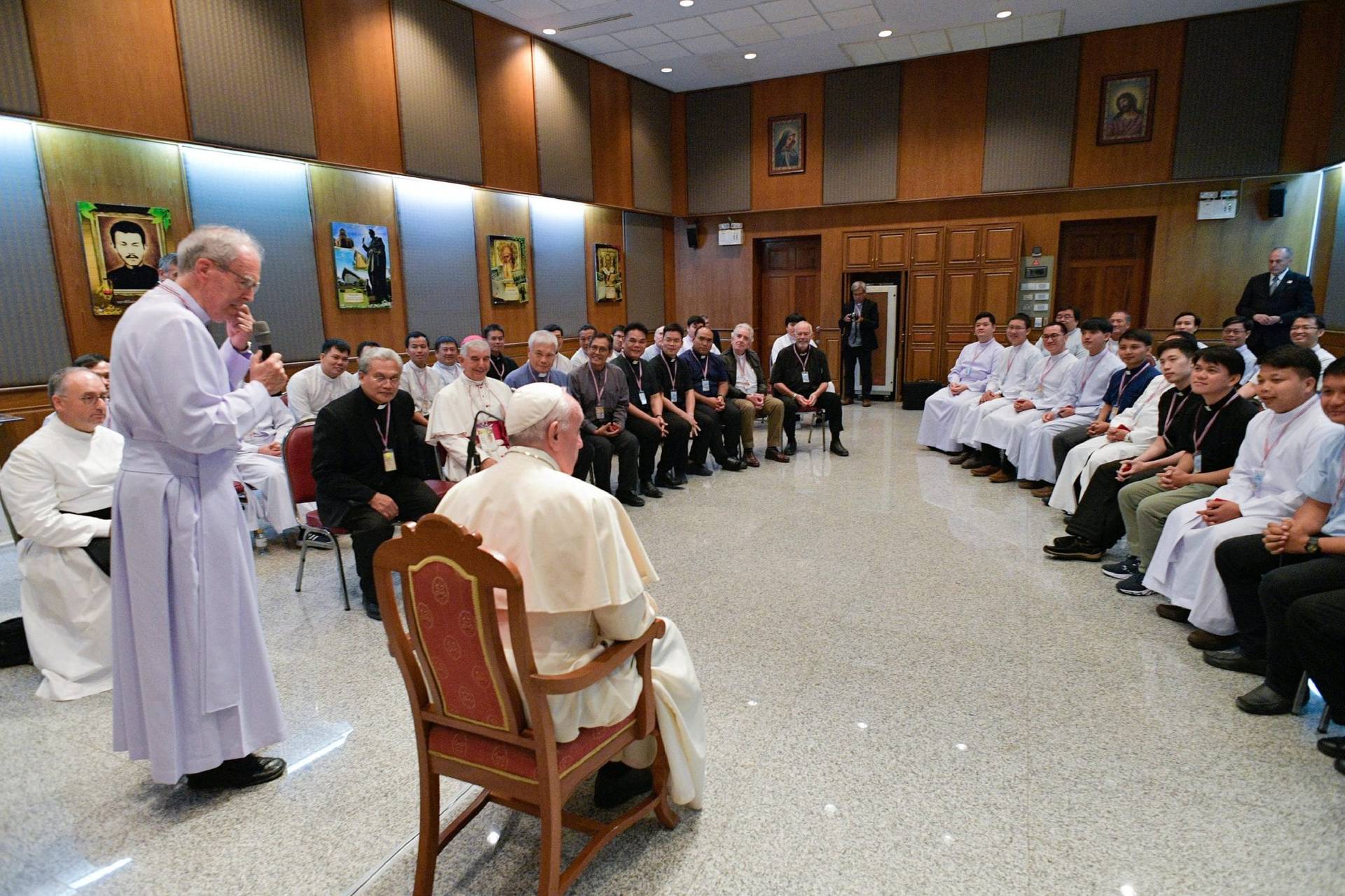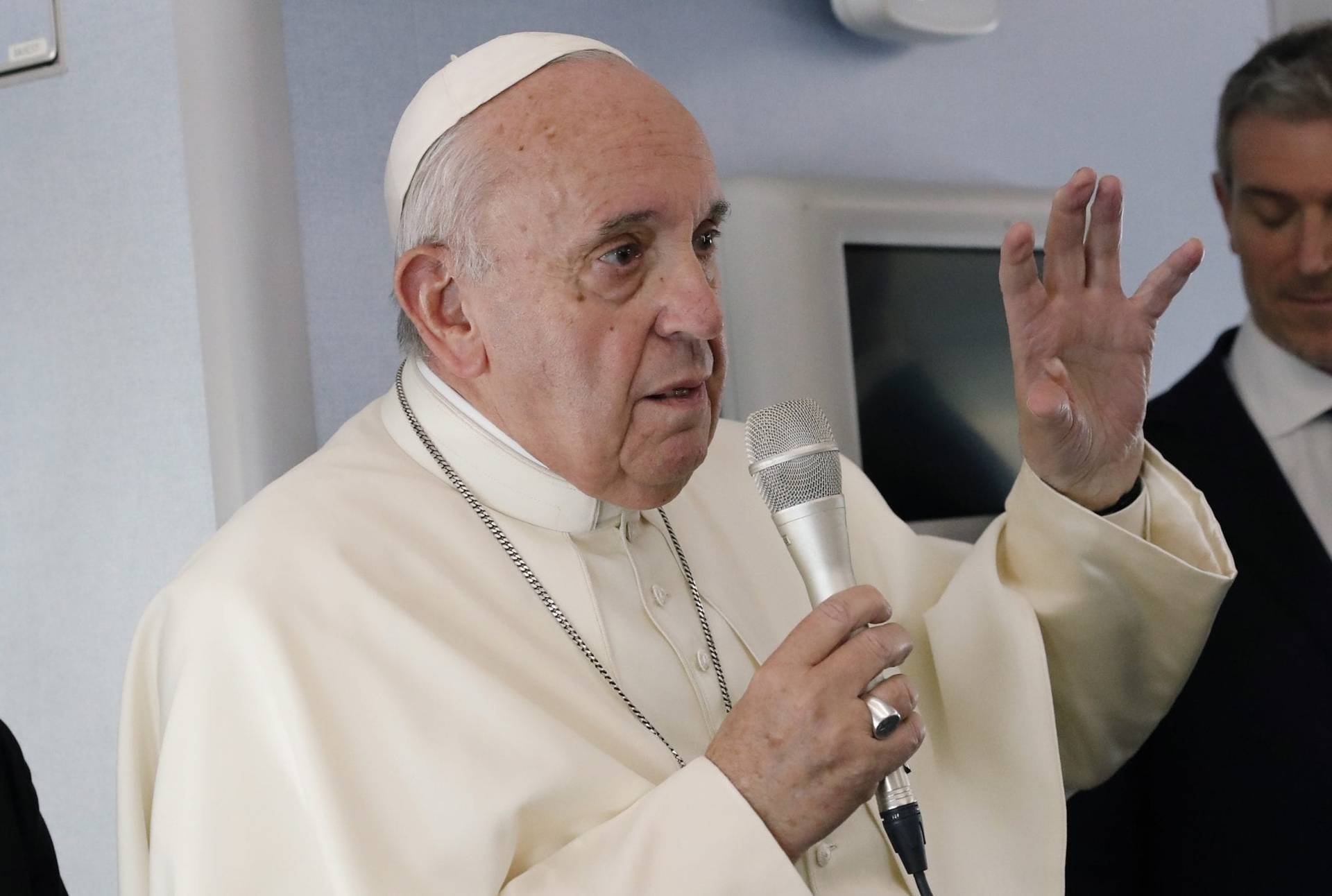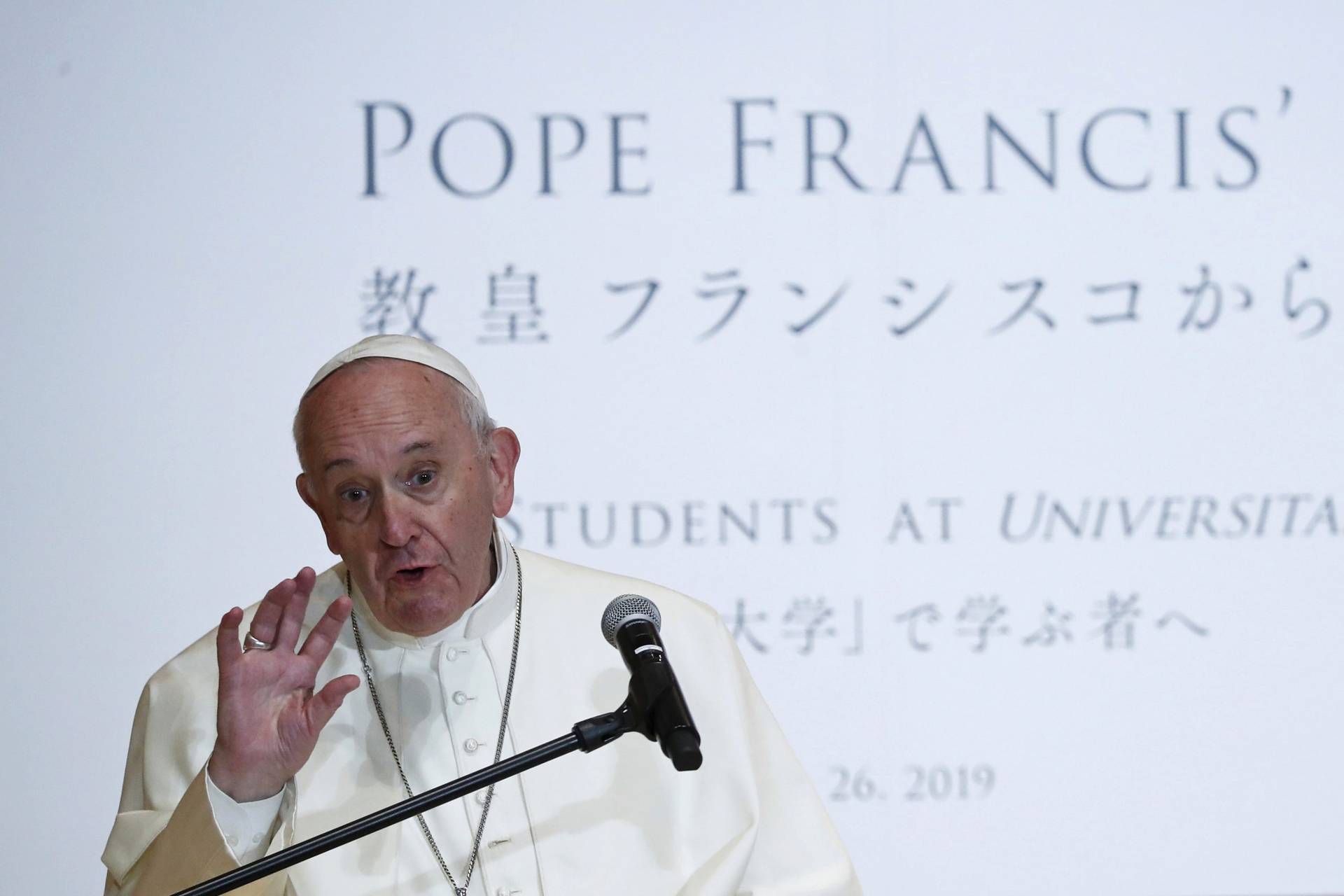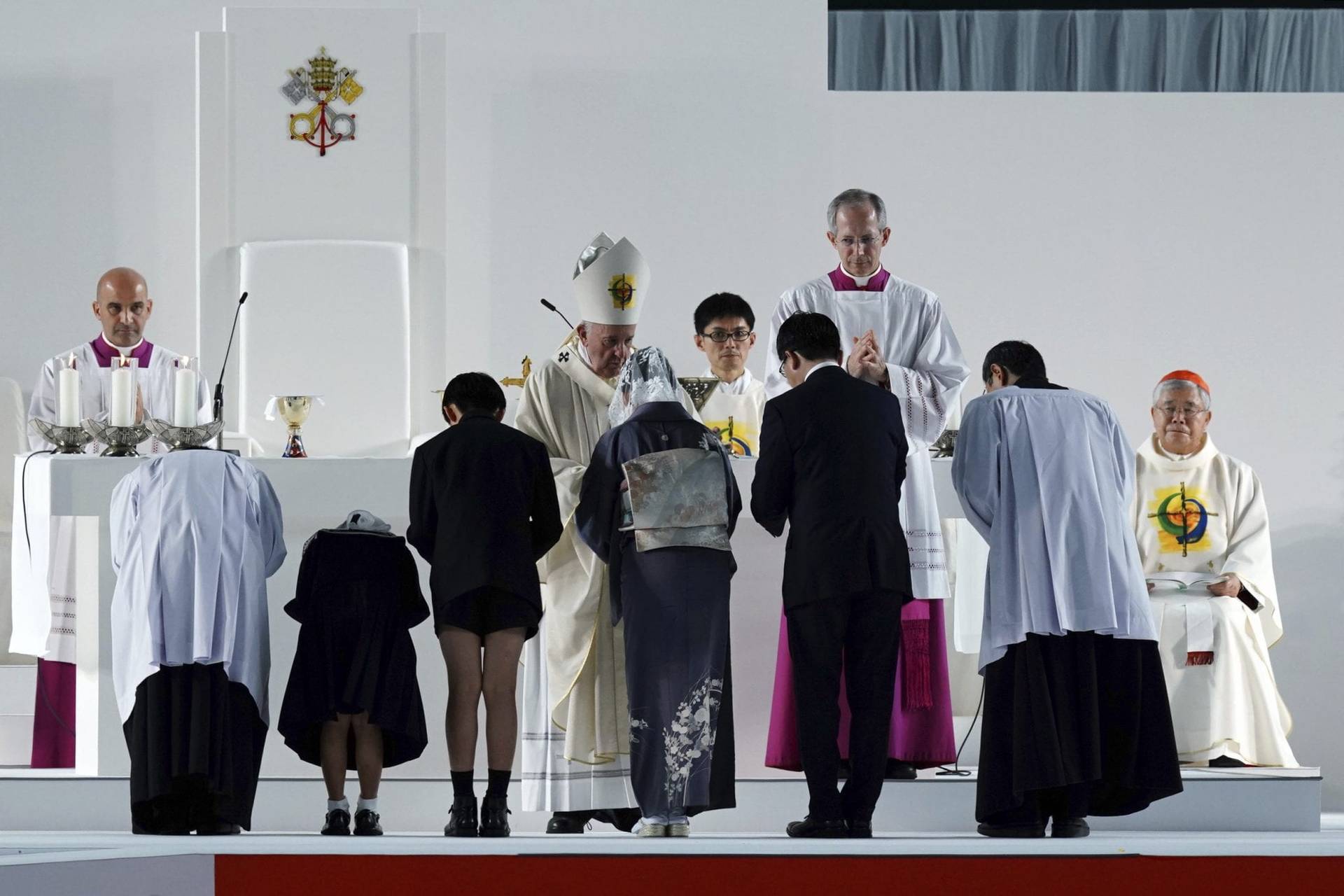BANGKOK, Thailand – During a visit to the largest Catholic healthcare facility in Thailand, Pope Francis said Thursday that those who suffer illness are allowed to cry out in pain, as Christ himself did, while praying for the comfort of God who is always present.
“Each of us knows how illness brings with it questions that dig deep,” Francis said. “Our first reaction may be to rebel and even experience moments of bewilderment and desolation.”
“We cry out in pain, and rightly so: Jesus himself shared in that suffering and made it his own,” he told 900 hospital employees, including doctors, nurses, and cleaning staff. “With prayer, we too want to join in his own cry of pain. By uniting ourselves to Jesus in his passion, we discover the power of his closeness to our frailty and our wounds.”
When facing adversity and affliction, the pope said, Christians are called to pray that they can find “the help needed to discover the comfort that comes from the Lord who does not hide himself.”
At a hospital with over 1,500 personnel including staff, doctors, nurses and others, Francis acknowledged the job “can prove burdensome and tiring; you work under extreme circumstances.” For this reason, the pastoral accompaniment of personnel is key, he said.
The pontiff stressed the principle with which the hospital operates, explained to him by the director: “Ubi caritas, Deus ibi est – where love is, there God is.”
“It is precisely in the exercise of charity that we Christians are called not only to demonstrate that we are missionary disciples, but also to take stock of our own fidelity and that of our institutions,” Francis said during his third speech of his Nov. 20-23 visit to Thailand, after which he heads to Japan.
Though the hospital doesn’t belong to the Vatican, it’s close to the embassy of the Vatican ambassador, separated only by a church.
The pope told the workers of the hospital, which is celebrating its 120th anniversary, that the job they do is a “living testimony” of the care and concern due everyone, especially “the elderly, the young and those most vulnerable.”
“How many people have received relief from their pain, comfort in their sorrow and companionship in their loneliness!” he told them. “As I give thanks to God for the gift of your presence over these years, I ask you to ensure that this and similar apostolates may increasingly become a sign and emblem of a Church on the move, which, in carrying out her mission, finds the courage to bring Christ’s healing love to those who suffer.”
After the hospital visit, the pope was scheduled to meet a group of patients of different ages and with various deceases and disabilities, as a way to “accompany them in their pain.”
The day before the pope’s visit to the hospital, some employees spoke with a small group of journalists, including Crux. They noted that disability remains a taboo in Thailand, so they shared hopes that Francis will help motivate a change, not only in society but within the government, so that measures to help the disabled can be taken.
Father Brice Testu, a French missionary who has been in Thailand for the past two years, belongs to the French Missionaries of Paris, which founded the hospital.
Clarifying that he can’t speak in the name of the hospital, he told journalists that he saw Francis’ visit as a “testimony to the fact that the pope is very interested in the way that Catholic Church tends to sick people and the poor.”
Noting that Catholics make up less than 0.5 percent of the total population of Thailand, he said that thanks to the level of its schools and hospitals, the Church has a good reputation.
“Everyone here is very excited, they feel very close to Rome and the person of the pope,” he said. To the side, an impromptu choir made of hospital personnel practiced songs to welcome Francis, one of which spoke of the love Thai people have for him.
“Wherever he will go, there will be numerous people happy to see him and welcome him,” Testu said.
Catholics in Thailand, he added, feel it is a great honor that the pope is in their land, and they are hoping that Francis will help them “be happy as Christians and be better missionaries.” Seeing that Buddhism is such an overwhelming majority, speaking about their religion is not something “natural” for Thai people, especially Catholics.
Buddhists in Thailand, he said, like what they know of the Catholic Church, but it’s often “very, very” little.
“Changing their religion is absolutely not something they would think about, because Buddhism is part of their culture, their nation, of their strongest identity,” Testu said.
Portuguese-sponsored Dominican missionaries first arrived in Thailand over 350 years ago. Despite the historic presence, the Catholic population has always remained a very small minority. For this reason, the missionary priest said, Thai Catholics know they are not “going to convert the whole country in the next couple of years.”
“It really leads us to ask how can we be missionaries, when you know the majority will not convert and you won’t baptize them tomorrow or next year,” he said. “So they are hoping that Pope Francis’ may be able to help them, maybe to give them advice on how they can be missionaries in their daily life.”
Doctor Thanin Santhanavanich agrees. He told journalists he hopes that the pope’s presence in the newspapers alonemwill help him talk about his faith more, because people will at least know what the Church is.
Excitement over Francis’ visit extends beyond the some 400,000 Catholics. The majority of the hospital staff, Santhanavanich said, are Buddhist, but they too welcome the visit with open arms.
As Ta, a woman working on flower arrangements in the audience hall, put it, “[Francis] is like superman. Because he helps the people, and he teaches us to help people and choose to help people.”
Follow Inés San Martín on Twitter: @inesanma
Crux is dedicated to smart, wired and independent reporting on the Vatican and worldwide Catholic Church. That kind of reporting doesn’t come cheap, and we need your support. You can help Crux by giving a small amount monthly, or with a onetime gift. Please remember, Crux is a for-profit organization, so contributions are not tax-deductible.
















